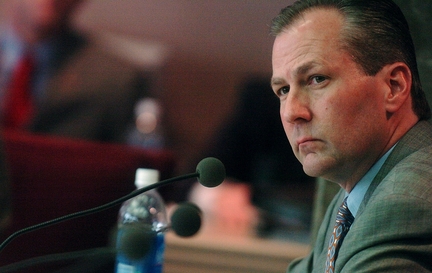 |
| Judge Sibley Reynolds (upper, right) in his Chilton County courtroom |
The amount that an unlawfully incarcerated Alabama woman must pay to settle her divorce has increased by almost $33,000, according to a new Web report on the case.
Bonnie Cahalane (Knox) Wyatt has been in the Chilton County Jail since July 26 because she failed to pay $165,000 as part of her divorce settlement. The Alabama Constitution states that citizens cannot be sent to jail because of debts, and case law specifically states that it is unlawful to incarcerate anyone because of failure to pay a property-related debt from dissolution of a marriage.
Alabama law, as best stated in a case styled Dolberry v. Dolberry, 920 So. 2d 573 (Ala. Civ. App., 2005), is clear: A party can be jailed for failure to pay a divorce-related debt, such as alimony, that involves "sustenance and support" of a former spouse; but a property-related debt is considered a contract matter, and the alleged debtor is subject to neither a finding of contempt nor incarceration.
So why has Chilton County Circuit Judge Sibley Reynolds flagrantly violated Alabama law by ordering that Bonnie Wyatt be sent to jail, for four months and counting? The only apparent answer is that Reynolds is intentionally acting outside the law, punishing Ms. Wyatt because someone sees her as a threat. The incarceration clearly has nothing to do with her divorce from Harold Jay Wyatt and any debt Ms. Wyatt allegedly owes to him. The couple lived together as man and wife for only about 10 months, so it's hard to see how Harold Wyatt could have such a large stake in a house that belonged to his wife prior to the marriage.
Now we learn that Judge Reynolds has increased the amount owed to $197,929.20. That comes from a report at examiner.com, written by Bradley Patterson, titled "Tyranny and Corruption, Alabama Style: Judge Sibley G. Reynolds." Patterson is the author of the Alabama blog Broke in Marshall County and has written extensively about issues connected to domestic-relations and family courts. From his report at examiner.com:
Chilton County resident Bonnie Sue Wyatt is now in her fifth consecutive month of incarceration for failure to pay a debt, under a civil contempt order signed by 19th Judicial Circuit Judge Sibley G. Reynolds. Earlier today several sources close to the case indicated that Ms. Wyatt is being held under indefinite incarceration, and some believe it may be motivated by corruption and not based in law. We have recently confirmed with officials in the Chilton County Courthouse that Ms. Wyatt must pay in full $197,920.19 to be released, in accordance with an order issued by Judge Reynolds on July 11.
Does Judge Reynolds have the slightest interest in handling Bonnie Wyatt's case according to law? Apparently the answer is no, based on this information from the examiner.com article:
Since her incarceration in July, Judge Reynolds has also stripped Ms. Wyatt of her custody rights to her children, and was said to have asked Ms. Wyatt, “Have you learned your lesson yet?” in open court on the day he stripped her rights to her children. This has led many to question the rumors about Ms. Wyatt's alleged ability to pay along with the judge's own motivations in the case. Ms. Wyatt indicated in appeals documents that she could not pay the amount ordered. Her attempts to appeal the order were denied by Judge Reynolds himself.
Why would Judge Reynolds ask Ms. Wyatt, "Have you learned your lesson yet?" What lesson is the judge trying to teach? Does that lesson have anything to do with the facts and the law in Wyatt v. Wyatt? Why did Reynolds raise such a question at a hearing where Ms. Wyatt's former husband--Bobby Knox, president of Shelby Concrete and a wealthy resident of Chilton County--was trying to get custody of their youngest daughter?
Clanton lawyer Angie Avery Collins is listed as Ms. Wyatt's attorney of record, but Patterson raises questions about Ms. Collins' performance. An emergency interlocutory appeal, called a writ of mandamus, clearly should be filed, asking the Alabama Court of Civil Appeals to force Reynolds to follow the mandate spelled out in the Dolberry case. In fact, such an emergency motion should have been filed back in July to put a stay on the arrest warrant and ensure that Ms. Wyatt would not be unlawfully jailed.
But the record shows that Ms. Collins has done little, if anything, to protect her client's interests. Are lawyers in and around Chilton County afraid to stand up to Sibley Reynolds? That's how it looks from here. From the examiner.com article:
Considering that under State law one can only be held for up to five days under criminal contempt, one has to wonder how Ms. Wyatt has remained incarcerated for over four months under civil contempt which is presumed to be less serious. Ms. Wyatt has previously retained the services of at least four attorneys on the matter. Most recently she hired Clanton, Alabama based attorney Angie Collins in the matter, though it appears that Ms. Collins has abandoned her client. Sources indicate that Ms. Collins received payment for her services, but now refuses to return the phone calls of those close to Ms. Wyatt. She has also not visited Ms. Wyatt at the jail nor has she taken any action to protect her client's interests.
Our own multiple phone calls about the case have not been returned either. Today her secretary indicated to us that Ms. Collins was in her office, but would call us “right back within 20 minutes.” As of press time, several hours have passed and she has not done so. Sources close to Ms. Wyatt are astonished at Ms. Collins' lack of cooperation to have her client's right to liberty restored.















